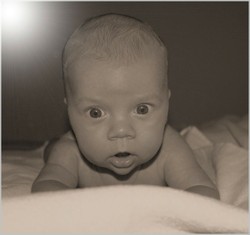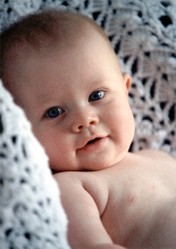Babies are all ears to the sounds in their world. When parents speak often to their baby, that baby will learn to repeat those same words back to the parents. If the baby hears more than one language, both of those languages will be familiar to him. In fact, in the first few years of life, a child will learn a second language in the same part of the brain as he or she learns the mother tongue.
A baby's early exposure to language is the key to becoming bilingual. The earlier a child hears the sounds distinctive to each language, the easier it will be for that child to understand and speak more than one language without an accent.
With each language a person can speak, a whole new world of thinking and words is opened up. Is your growing child exposed to more than one language? What a gift to give to your little one!











 Children Learn Through Playon 09/17/2015
Children Learn Through Playon 09/17/2015
 Boston Public Gardenon 06/19/2015
Boston Public Gardenon 06/19/2015
 Remembering the Supremeson 01/20/2014
Remembering the Supremeson 01/20/2014
 How to Help Your Baby Sleepon 09/14/2013
How to Help Your Baby Sleepon 09/14/2013



Comments
Thanks, Mira, I'm glad you liked it. When we are aware of how we learn a language, we can make better choices about such things as when to introduce a second language in schools or how to deal with raising a family when living in a new country or when one parent speaks a different language from the local one.
Hi sheilamarie, what a nice article. Even as I knew it's recommended you expose a child to a second language as early as possible, I didn't know that for babies language processing happens in the same part of the brain they use to learn their mother tongue. I also enjoyed the video about how children "take statistics" of various sounds in a language, and how they learn from another human being: not from audio, not from video -- how fascinating. And when you think about it, even later in life it's interaction that gives you a better facility with a language. Thank you for the article! :-)
Thanks for all the wonderful comments! Your little ones are being given such a precious gift, Brenda, Amelie, Peggy, and Jimmie. Spirituality, you are right that in Europe and in many other places in the world, learning more than one language is standard, as there are so many people speaking different languages who live so close together. Here in North America we have a harder time learning another language because there are seldom real people who speak the language we're trying to learn. Of course, this isn't always true, especially where there are lots of immigrants. Generally, though, most of us grow up speaking only English.
Having more than one language helps your mind be more flexible.
Both my daughter and daughter-in-law are speech pathologists. My daughters husband is from Thailand. Their kids are learning both languages.
I'm fluent in Dutch and English, can hold a conversation in German and - if the person I'm talking with is patient - in French. The first two are due to me being Dutch and having lived in the USA for a year when I was 12. The rest is due to the Dutch educational system. German was one of the languages I graduated in. I had French lessons in school for four years. All standard stuff for us here.
I started learning a second language when I was around 8-years-old. Even that was not early enough, but it really does help getting to grasps with the basics at a young age.
This is interesting. My children will be bilingual since we are English but live in Spain.
I only speak English but my son and his wife are teaching my two grandkids Chinese and they take lessons. You're right that the younger a child is the better they absorb a new language.
I come from a monolingual environment, but my daughter was raised abroad. Therefore she is bilingual. It is a wonderful ability.
Very interesting.